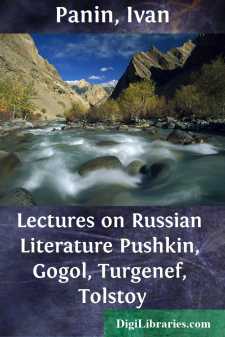Categories
- Antiques & Collectibles 13
- Architecture 36
- Art 48
- Bibles 22
- Biography & Autobiography 813
- Body, Mind & Spirit 142
- Business & Economics 28
- Children's Books 15
- Children's Fiction 12
- Computers 4
- Cooking 94
- Crafts & Hobbies 4
- Drama 346
- Education 46
- Family & Relationships 57
- Fiction 11828
- Games 19
- Gardening 17
- Health & Fitness 34
- History 1377
- House & Home 1
- Humor 147
- Juvenile Fiction 1873
- Juvenile Nonfiction 202
- Language Arts & Disciplines 88
- Law 16
- Literary Collections 686
- Literary Criticism 179
- Mathematics 13
- Medical 41
- Music 40
- Nature 179
- Non-Classifiable 1768
- Performing Arts 7
- Periodicals 1453
- Philosophy 64
- Photography 2
- Poetry 896
- Political Science 203
- Psychology 42
- Reference 154
- Religion 513
- Science 126
- Self-Help 84
- Social Science 81
- Sports & Recreation 34
- Study Aids 3
- Technology & Engineering 59
- Transportation 23
- Travel 463
- True Crime 29
Lectures on Russian Literature Pushkin, Gogol, Turgenef, Tolstoy
by: Ivan Panin
Description:
Excerpt
1. I have chosen the four writers mentioned on the programme not so much because they are the four greatest names of Russian literature as because they best represent the point of view from which these lectures are to be delivered. For what Nature is to God, that is Literature unto the Soul. God ever strives to reveal himself in Nature through its manifold changes and developing forms. And the human soul ever strives to reveal itself in literature through its manifold changes and developing forms. But while to see the goal of the never resting creativeness of God is not yet given unto man, it is given unto mortal eyes to behold the promised land from Pisgah, toward which the soul ever strives, and which, let us hope, it ever is approaching. For the soul ever strives onward and upward, and whether the struggle be called progress of species, looking for the ideal, or union with God, the thing is the same. It is of this journey of the soul heavenward that literature is the record, and the various chases of literary development in every nation are only so many mile-posts on the road.
2. In its childhood the human soul only exists; it can hardly yet be said to live; but soon it becomes conscious of its existence, and the first cry it utters is that of joy. Youth is ever cheerful, and in its cheer it sings. Youth sings to the stars in the sky, to the pale moon and to the red moon, to the maiden's cheeks and to the maiden's fan; youth sings to the flower, to the bee, to the bird, and even to the mouse. And what is true of the individual is equally true of the race. The earliest voices in the literature of any nation are those of song. In Greece Homer, like his favorite cicada, chirps right gladly, and in England Chaucer and Shakespeare are first of all bards. In France and Germany it is even difficult to find the separate prominent singers, for there the whole nation, whatever hath articulate voice in it, takes to singing with its troubadours and minnesingers. In its earliest stages then the soul sings, not in plaintive regretful strain, but birdlike from an overflowing breast, with rejoicings and with mirth.
3. But the time soon arrives when the soul recognizes that life means something more than mere existence, something more than mere enjoyment, something more even than mere happiness; the time soon arrives when the soul recognizes that by the side of the Prince of Light there also dwells the Prince of Darkness; that not only is there in the Universe a great God the Good, but also a great Devil the Evil; and with the impetuosity and impassionateness of youth it gives itself up to lamentation, to indignation. The heart of the poet, the singer, is now filled with woe; he departs and leaves behind him only the lamenter, the reproacher, the rebel. Job succeeds Miriam, Æschylus succeeds Homer, Racine and Corneille take the place of the troubadours, and Byron succeeds Shakespeare. This is the stage of fruitless lamentation and protest.
4. But unlike the bear in winter, the soul cannot feed long on its own flesh, and the time soon comes when it beholds the wasteful restlessness of mere indignation, of mere protest....


